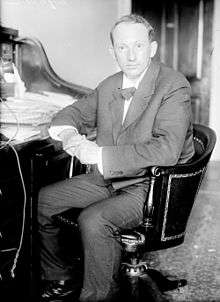Pat Harrison
| Pat Harrison | |
|---|---|
 Pat Harrison | |
| President pro tempore of the United States Senate | |
|
In office January 6, 1941 – June 22, 1941 | |
| Preceded by | William H. King |
| Succeeded by | Carter Glass |
| United States Senator from Mississippi | |
|
In office March 4, 1919 – June 22, 1941 | |
| Preceded by | James K. Vardaman |
| Succeeded by | James Eastland |
| Member of the U.S. House of Representatives from Mississippi's 6th district | |
|
In office March 4, 1911 – March 3, 1919 | |
| Preceded by | Eaton J. Bowers |
| Succeeded by | Paul B. Johnson, Sr. |
| Personal details | |
| Born |
Byron Patton Harrison August 29, 1881 Crystal Springs, Mississippi |
| Died |
June 22, 1941 (aged 59) Washington, D.C. |
| Resting place | Evergreen Cemetery |
| Political party | Democratic |
| Alma mater |
University of Mississippi Louisiana State University |
| Profession | Lawyer |
Byron Patton "Pat" Harrison (August 29, 1881 – June 22, 1941) was a Mississippi politician who served as a Democrat in the United States House of Representatives from 1911 to 1919 and in the United States Senate from 1919 until his death.
Early life and education
Pat Harrison was born at Crystal Springs, Mississippi. His father was a Confederate veteran of the Civil War and died in 1885.[1] As a child, Harrison sold newspapers to supplement his family's income.[1] After graduating as class valedictorian from Crystal Springs High School in 1899, he attended a summer term at the University of Mississippi before transferring to Louisiana State University at Baton Rouge on a baseball scholarship.[2]
He dropped out after two years due to a lack of funds but was brought on to pitch for the Pickens, Mississippi, semi-professional baseball team in the 'Old Tomato League' summer circuit.[2] After his stint in semi-professional baseball, Harrison moved to Leakesville, Mississippi. He taught and later became principal of the local high school.[2] While supporting himself as an educator, Harrison studied law. He passed the Mississippi State Bar and opened a law practice in 1902.[1][2]
Legal and political career
In 1906, Harrison was elected district attorney to the Second Judicial District, and in 1908, moved to Gulfport, Mississippi.[2][3] He served as district attorney until being elected to the U.S. House of Representatives in 1910.[1] The 1910 election introduced Harrison as a skilled orator and witty debater, a reputation he maintained throughout his political career. Newspaper editor Clayton Rand described his longtime friend's oratory style as "an eloquence that flowed like a babbling brook through a field of flowers."[2]
Political career
After four years as district attorney on the Mississippi Gulf Coast, Harrison won a seat in the U.S. House of Representatives in 1911 and was re-elected three times.[3] One of the youngest members of the House, Harrison made his mark as an effective debater against Republican tariff and tax policies and soon became a favored aide to Democratic President Woodrow Wilson.[2] In particular, Harrison supported Wilson's New Freedom policies and those concerning Mexico and Germany at the onset of America's involvement in World War I.[2] In 1918, he ran against incumbent U.S. Senator James K. Vardaman, an enemy of President Wilson.[2] In return for Harrison's past support, President Wilson personally endorsed him for Senator.[2] Already popular among his constituents, Harrison emphasized his differences with Vardaman and won over a majority of Mississippi voters, who were effectively limited to white Democrats, following the state legislature's disenfranchisement of most black voters by a new constitution and discriminatory practices dating from 1890. After winning Vardaman's Senate seat in 1918, Harrison was re-elected for another three terms, as Mississippi was a one-party state dominated by Democrats. He ran unopposed in 1930 for his third term in the U.S. Senate.[2]
A supporter and former law partner of Theodore G. Bilbo, Stewart C. "Sweep Clean" Broom surprisingly aided Harrison's 1936 reelection campaign by giving a well-received speech encouraging "Bilbo folks" to save Bilbo "from his own blunder."[4] Despite having received past help from Harrison, Bilbo actively supported Martin Sennett Conner for Harrison's Senate seat, presumably as a self-serving political maneuver.[5]
As chairman of the powerful Senate Finance Committee, Harrison was one of the three or four key people behind the creation of the Social Security system in 1935. He also promoted low tariffs and reciprocal trade agreements. When the Senate majority leader’s job opened up in 1937, Harrison was expected to win the position,[2] but nose counts put him in a near tie with Kentucky’s Alben Barkley.[6] Harrison’s campaign manager asked Bilbo, the junior member from Mississippi, to consider voting for his fellow Mississippian. Bilbo, a race-baiting Democratic demagogue whose base was among tenant farmers, hated the upper-class Harrison, who represented the rich planters. The rivalry between the two had deepened over years of disagreement over aspects of the New Deal and how federal money should distributed throughout Mississippi.[2] Bilbo said he would vote for Harrison only if he were personally asked. Harrison replied, “Tell the son of a bitch I wouldn’t speak to him even if it meant the presidency of the United States.”[7] Despite Harrison's support for Roosevelt and his policies, shortly before the vote, the president wrote a letter of support for Barkley.[2] When the ballots were in, Pat Harrison lost by one vote, 37-to-38.
Harrison served on the Senate Finance Committee and was chairman of that body from 1933 to 1941 (Seventy-third through Seventy-seventh Congresses) and served as President pro tempore of the Senate during the Seventy-seventh Congress. He was also a supporter of the Conservative coalition.
Political reputation
Harrison was a highly effective politician and a brilliant orator. He listened to his district and provided information, services, and patronage. Due to his ability to maneuver though the political landscape and because he was well-liked by many of his fellow politicians, Harrison became rather influential in both legislation and political endorsement. In 1928, he supported New York Governor Al Smith for President and campaigned for him across the South, where there was opposition and superstition among Democrats because Smith was Catholic.
Harrison became known as the "Gadfly of the Senate" due to his oratory rebuking Republican policies.
At the 1932 Democratic convention, he swung the Mississippi delegation to Franklin D. Roosevelt on the crucial third ballot and became welcome at the White House.
Bibliography
- Coker, William S. "Pat Harrison - Strategy for Victory". Journal of Mississippi History 1966 28(4): 267-285.
- Coker, William Sidney. "Pat Harrison: the Formative Years." Journal of Mississippi History 1963 25(4): 251-278.
- Davis, Polly. "Court Reform and Alben W. Barkley's Election as Majority Leader". Southern Quarterly 1976 15(1): 15-31.
- Edmonson, Ben G. "Pat Harrison and Mississippi in the Presidential Elections of 1924 and 1928". Journal of Mississippi History 1971 33(4): 333-350.
- Grant, Philip A., Jr. "Editorial Reaction to the Harrison-Barkley Senate Leadership Contest, 1937". Journal of Mississippi History 1974 36(2): 127-141.
- Grant, Philip A., Jr. "The Mississippi Congressional Delegation and the Formation of the Conservative Coalition, 1937-1940". Journal of Mississippi History 1988 50(1): 21-28.
- Finley, Keith M. Delaying the Dream: Southern Senators and the Fight Against Civil Rights, 1938-1965 (Baton Rouge, LSU Press, 2008).
- Lord, Lewis. U. S. News & World Report, June 17, 1996, p. 12.
- Swain, Martha H. Pat Harrison: The New Deal Years (Jackson, Miss., 1978), the standard biography
- Swain, Martha. "Pat Harrison and the Social Security Act of 1935". Southern Quarterly 1976 15(1): 1-14.
- Swain, Martha H. "The Lion and the Fox: the Relationship of President Franklin D. Roosevelt and Senator Pat Harrison". Journal of Mississippi History 1976 38(4): 333-359.
- Thomas, Phyllis H. "The Role of Mississippi in the Presidential Election of 1916," Southern Quarterly, 1966 4(2): 207-226.
References
- 1 2 3 4 "Pat Harrison Collection". University of Mississippi. 1883–1943. Retrieved September 21, 2011.
|first1=missing|last1=in Authors list (help) - 1 2 3 4 5 6 7 8 9 10 11 12 13 14 Swain, Martha H. (September 2011). "Senator Pat Harrison: New Deal Workhorse (1933-1941) Suspicious of His Load". Mississippi History Now. Mississippi Historical Society. Retrieved September 21, 2011.
- 1 2 "Harrison, Byron Patton (Pat)". Biographical Directory of the United States Congress. United States Congress. Retrieved September 21, 2011.
- ↑ "Broom or Bilbo". Time. August 24, 1936.
- ↑ "Mississippi: Indestructible Man". Time. September 9, 1940. Retrieved September 21, 2011.
- ↑ "Bitter Fight in Progress Over New Leader of Senate". The Chillicothe Constitution-Tribune. July 20, 1937. p. 6. Retrieved September 21, 2011.
In the fight for the leadership today's session until Thursday which will be devoted to considering over of the Senate, however, neither Harrison or Barkley forces would express more than a hopeful optimism. An impartial check of votes claimed showed that not more than three or four separated the two candidates.
- ↑ "Mississippi Spurning". U.S. News & World Report. 120: 122. 1996. Retrieved September 21, 2011.
External links
- The Pat Harrison Collection (MUM00222) and Pat Harrison portraits can be found at the University of Mississippi in the Archives and Special Collections
- Byron Patton Harrison at Find a Grave
| United States House of Representatives | ||
|---|---|---|
| Preceded by Eaton J. Bowers |
Member of the U.S. House of Representatives from Mississippi's 6th congressional district 1911-1919 |
Succeeded by Paul B. Johnson, Sr. |
| United States Senate | ||
| Preceded by James K. Vardaman |
U.S. Senator (Class 2) from Mississippi 1919–1941 Served alongside: John Sharp Williams, Hubert D. Stephens, Theodore G. Bilbo |
Succeeded by James O. Eastland |
| Political offices | ||
| Preceded by William H. King |
President pro tempore of the United States Senate January 6, 1941 – June 22, 1941 |
Succeeded by Carter Glass |
| Preceded by Reed Smoot Utah |
Chairman of the U.S. Senate Committee on Finance 1933–1941 |
Succeeded by Walter F. George Georgia |

